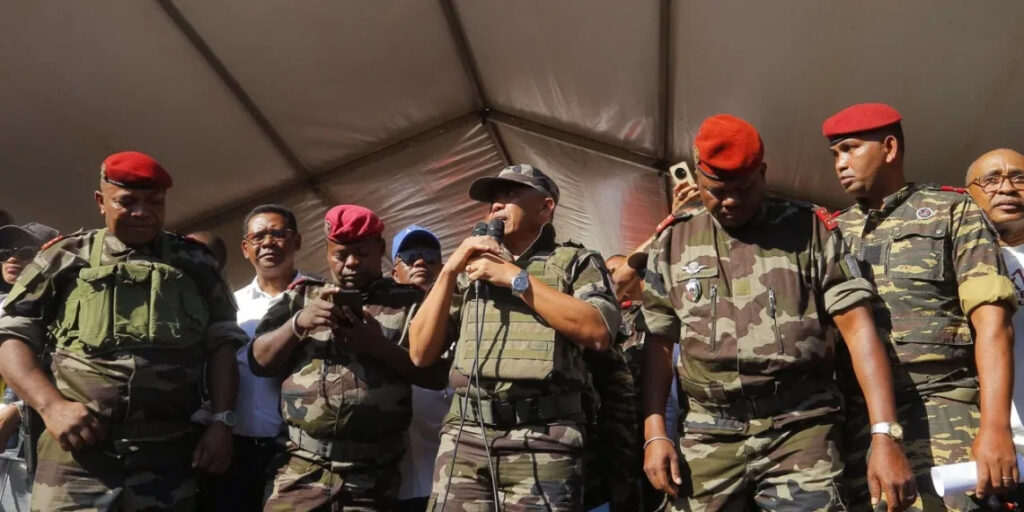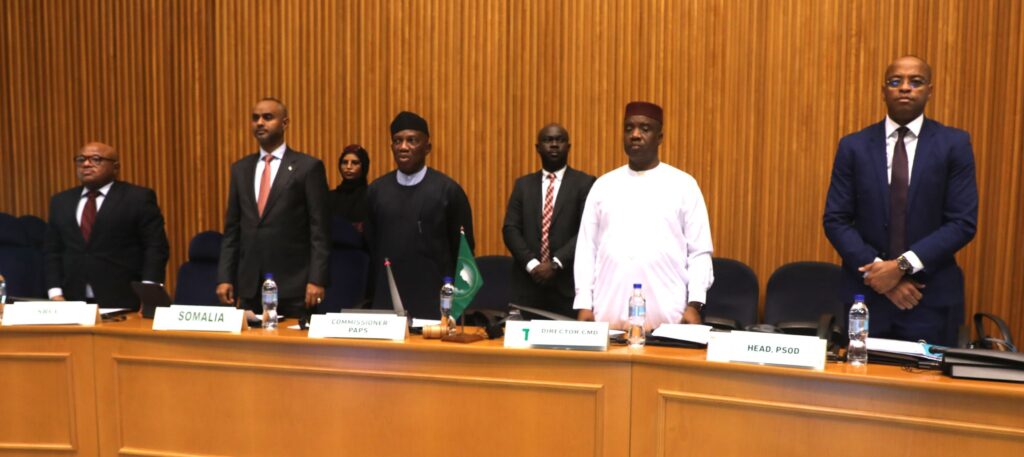
1.0 Introduction
On 15th October 2025, the African Union (AU) suspended Madagascar from AU Organs and institutions following a military takeover (coup d’état), marking another major test of continental resolve against unconstitutional changes of government. The AU’s Peace and Security Council (PSC) swiftly condemned the seizure of power, declaring Madagascar’s suspension until a constitutional order is restored (African Union, 2025). The AU’s decisive action reflects its zero-tolerance policy for coups, as enshrined in the Lomé Declaration (2000) and the African Charter on Democracy, Elections and Governance (2007). This move comes amid growing regional instability in the continent, including previous interventions in Sudan (2021), Chad (2021), and Niger (2023), where military takeovers similarly undermined democratic governance and peace efforts (Al Jazeera, 2025; Reuters, 2025). In Madagascar, the AU’s intervention—through suspension and the planned deployment of a high-level delegation in coordination with the Southern African Development Community (SADC)—aims to facilitate inclusive dialogue and restore civilian rule. The suspension signals a reaffirmation of continental norms: that political power must not be seized by force. As in earlier cases in Sudan and Niger, the AU emphasizes dialogue, mediation, and good governance rather than military enforcement. Using a security foresight lens, this commentary examines the implications of Madagascar’s suspension for regional peace and stability, assessing the AU’s broader geopolitical posture and consistency in enforcing constitutionalism. The purpose of this commentary is to critically analyze how Madagascar’s suspension strengthens or tests the AU’s framework for maintaining constitutional order and regional security.
2.0 Key Issues
2.1 The AU’s Consistency in Addressing Unconstitutional Changes of Government

The recent AU’s suspension of Madagascar reinforces its established doctrine, which rejects coups as an illegitimate means of regime change. However, consistency in enforcement remains a challenge. While Madagascar’s suspension mirrors responses in Sudan and Niger, differing levels of engagement have raised perceptions of selective enforcement (APA News, 2025). In Sudan, despite AU condemnation, the prolonged military rule has persisted with limited sanctions. Similarly, in Chad, transitional arrangements tolerated by the AU undermined its normative credibility. The AU’s firm response to Madagascar may therefore represent a corrective effort to restore institutional legitimacy. This stance also has implications for Eastern Africa, where political fragility in countries like Ethiopia, Somalia, and South Sudan continues to test regional governance frameworks (Africanews, 2025). The AU’s unwavering opposition to unconstitutional takeovers thus remains central to sustaining democratic legitimacy and restoring trust in continental mechanisms for peace and security.
2.2 Regional Geopolitical Implications of Madagascar’s Suspension
Madagascar’s suspension carries significant geopolitical implications for the Greater Eastern Africa region. The island’s strategic position along the Indian Ocean and its participation in the Indian Ocean Rim Association and SADC make its political stability vital for maritime trade and counter-piracy operations (Ecofin Agency, 2025). Instability in Madagascar could ripple into Eastern and Southern African economic corridors, undermining regional integration efforts under the African Continental Free Trade Area (AfCFTA). The current AU’s decision hence aligns with the collective security philosophy embedded in the AU Constitutive Act, prioritizing peace as a shared regional good. Comparatively, similar AU actions in Sudan and Comoros have sought to prevent spillover effects from coups into neighboring states (Reuters, 2025). Thus, Madagascar’s suspension is not only a disciplinary measure but also a preventive move, safeguarding broader regional stability and signaling AU’s readiness to act against any attempt to erode democratic governance in strategically significant states.
2.3 The Security Foresight Lens—Predicting and Preventing Future Instability
Applying a security foresight approach reveals that the AU’s response in Madagascar reflects a preventive rather than reactive framework. By swiftly suspending the country, the AU aims to deter future military interventions in politically fragile states such as Somalia, South Sudan, and Sudan, where governance crises remain acute (Al Jazeera, 2025). Security foresight underscores the need for early warning systems, scenario planning, and cross-institutional coordination to predict instability before it escalates into unconstitutional power grabs. The Continental Early Warning System (CEWS) and the African Governance Architecture (AGA) must be strengthened to identify governance vulnerabilities and anticipate military discontent. Madagascar’s case thus provides a testing ground for refining foresight-driven interventions. The AU’s approach—combining suspension with mediation and regional collaboration—demonstrates that proactive governance foresight is crucial for maintaining continental peace and stability amid the resurgence of coups across Africa.
2.4 Challenges and Opportunities for Restoring Constitutional Order

Restoring constitutional order in Madagascar presents both immediate challenges and strategic opportunities. The military’s hold on power complicates mediation, while deep social divides and public disillusionment with governance persist (India Today, 2025). The AU’s reliance on diplomatic pressure through suspension may lack sufficient leverage unless reinforced by economic and political sanctions in collaboration with SADC and the UN. However, Madagascar’s suspension also opens opportunities for inclusive dialogue, youth engagement, and civil society participation in shaping post-crisis governance challenges . Drawing lessons from the AU’s facilitation roles in Sudan (2019–2021) and Comoros (2010), success depends on sustained mediation and credible transitional timelines. This case offers a critical juncture for the AU to reaffirm its credibility as a custodian of constitutionalism and for Malagasy stakeholders to demonstrate political maturity by embracing compromise and prioritizing national unity over factional interests.
3.0 Conclusion
Madagascar’s suspension from the AU marks a decisive reaffirmation of Africa’s collective stance against unconstitutional power seizures. Through its swift condemnation, coordination with SADC, and commitment to mediation, the AU reinforces its core values of democracy, legality, and peace. Yet, its credibility depends on consistent enforcement across all member states. The case highlights that peace and governance are inseparable, and regional security cannot thrive amid impunity for coups. For Eastern Africa, this precedent reinforces the AU’s expectation of constitutional governance as a cornerstone for long-term stability. The AU’s firm yet diplomatic approach underscores Africa’s maturing regional security architecture.
4.0 Policy Recommendations
4.1 Strengthen Consistency and Accountability in AU Responses

The AU should institutionalize a uniform framework for addressing unconstitutional changes of government across all regions. A continental “Accountability Matrix” under the PSC could establish clear timelines and sanctions applicable to all cases, ensuring fairness and predictability. Lessons from divergent AU responses in Sudan, Chad, and Mali underscore the need for even-handed enforcement. Transparent enforcement would restore faith in the AU’s credibility and prevent perceptions of bias. Regular public briefings and engagement with civil society networks across Eastern Africa would further enhance legitimacy. Ensuring that suspension mechanisms are consistently applied reinforces the AU’s role as an impartial guardian of democratic governance and constitutional order across Africa.
4.2 Enhance Regional Cooperation through Joint Mediation and Sanctions
The AU should deepen cooperation with sub-regional bodies like SADC, IGAD, and COMESA to ensure coherent mediation and coordinated sanctions. The success of restoring civilian rule in Madagascar will depend on a united front from African institutions, as fragmented responses weaken leverage. Drawing from the joint AU-ECOWAS mediation in Niger (2023), regional solidarity can enhance diplomatic pressure and offer credible transitional frameworks. Strengthened coordination mechanisms between the AU and regional blocs would also prevent duplication of efforts and promote sustainable conflict resolution. For Eastern Africa, this recommendation reinforces a cooperative model where collective diplomacy—not unilateral action—anchors continental peacebuilding and reinforces deterrence against unconstitutional governance.
4.3 Invest in Security Foresight and Early Warning Systems
The AU should operationalize foresight-based governance monitoring to identify coup risks before they materialize. Strengthening the CEWS and embedding foresight analysts within AU and regional structures would enable scenario modeling for fragile states like Somalia, Sudan, and Ethiopia. Regular publication of “Governance Stress Indexes” could inform preventive diplomacy missions. The AU’s Peace and Security Department, working with the African Governance Architecture, should integrate foresight data with political risk assessments to anticipate military discontent or constitutional crises. Such anticipatory mechanisms will transition the AU from reactive suspension toward proactive prevention—aligning continental peace and governance with the predictive demands of modern security management.
4.4 Prioritize Inclusive National Dialogue and Governance Reform
The AU and SADC should prioritize inclusive dialogue frameworks in Madagascar involving political parties, civil society, women, and youth. Sustainable peace requires participatory constitutional reform and accountability for any rights violations during the crisis. The AU’s facilitation model in Sudan (2019) and its post-conflict reconstruction in Somalia demonstrate that inclusive governance builds legitimacy and reduces relapse risks. Technical assistance should support electoral reform, decentralization, and civic education. Beyond Madagascar, Eastern Africa can adopt this model to strengthen resilience against coups. Institutionalized national dialogues will promote democratic renewal and reaffirm Africa’s long-standing commitment to constitutional governance as the cornerstone of peace and security.
5.0 References
African Union. (2025, October 16). AU suspends Madagascar following military takeover. https://au.int/en/pressreleases
Al Jazeera. (2025, October 15). African Union suspends Madagascar after military takeover. https://www.aljazeera.com
APA News. (2025, October 17). AU condemns the unconstitutional change of government in Madagascar. https://apanews.net
Ecofin Agency. (2025, October 18). Madagascar suspended from AU activities after coup. https://www.ecofinagency.com
Reuters. (2025, October 20). Madagascar protesters demand the president’s resignation amid unrest. https://www.reuters.com
India Today. (2025, October 19). AU demands restoration of civilian rule in Madagascar. https://www.indiatoday.in
Africanews. (2025, October 21). AU’s zero-tolerance stance on coups: A test for regional governance. https://www.africanews.com
